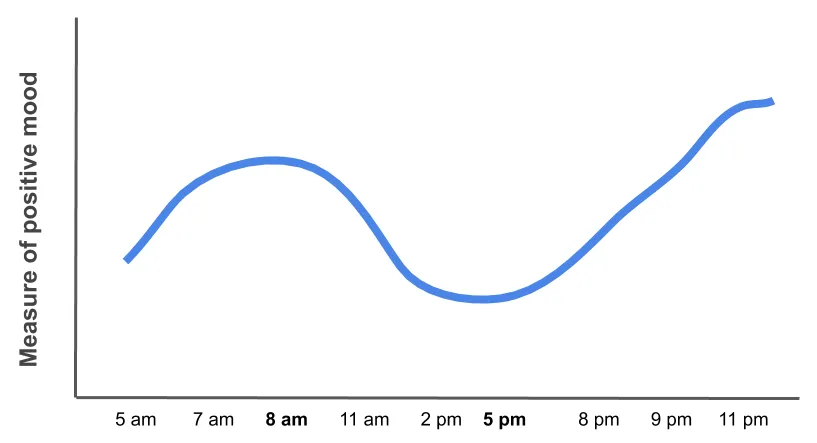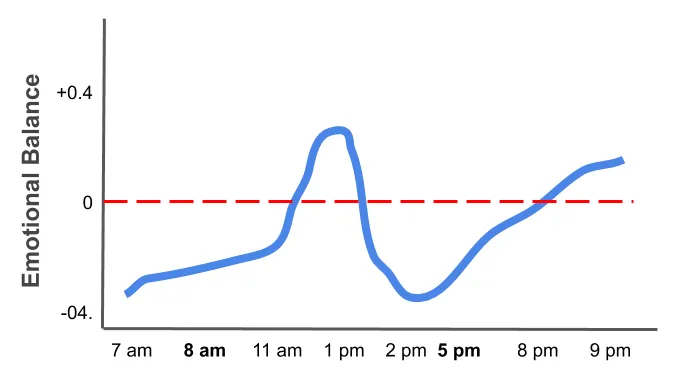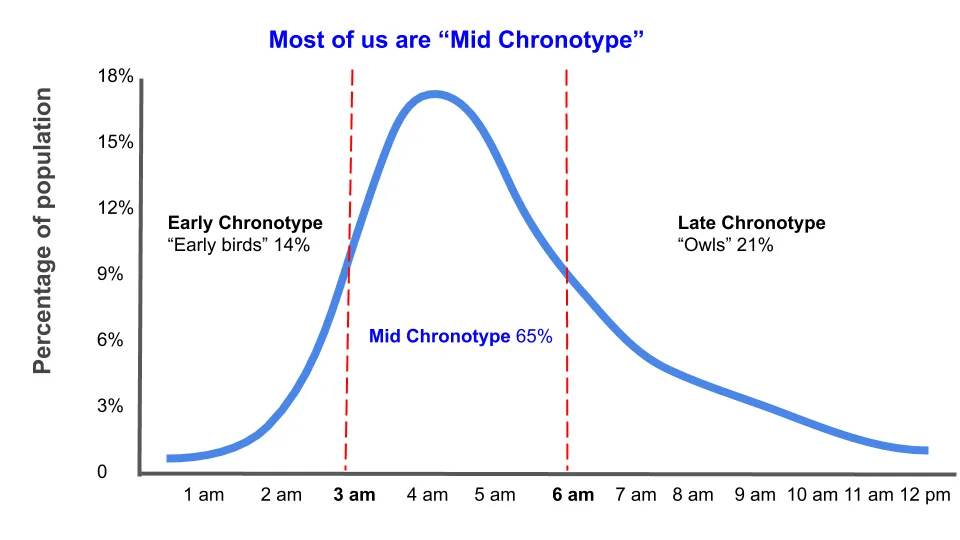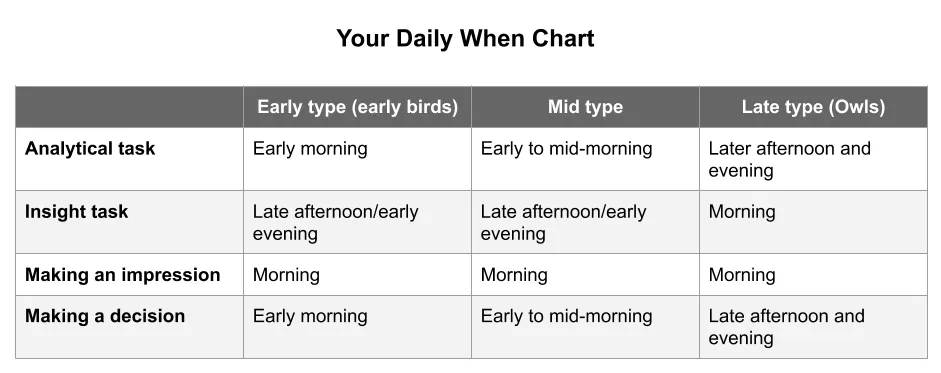3 Tips To Operate At Peak Performance: Insights From The Hidden Pattern Of Everyday Life
Sometimes work can feel overwhelming and/or draining. We can feel that we’re not achieving our best and we wish we knew how to make the day better.
We wish we could change something in our daily routine that would give us more enthusiasm, and energy and makes us feel like an A-player.
We look for ways to boost our energy – coffee or energy drinks – we artificially try to pump ourselves up to not show signs of weakness.
We look for various external “hacks” to get on top of things. Sometimes it works, but often it doesn’t…
In most cases, we overlook what’s really happening inside (our body and mind) and how we can take advantage of it.
Having a scientific background in cell biology, genetics, and neuroscience, I get really excited when I come across research and ideas on how to activate our potential from within. What I’m going to share with you comes from Daniel Pink’s latest book “WHEN – The Scientific Secrets of Perfect Timing”
What follows are insights from the study of biological rhythms and how a deeper understanding of our own personal “Clock” can help us improve our performance, fulfilment, and our results in life.
For example, did you know that positive mood rises in the morning, dips in the afternoon, and rises again in the evening?

Regardless of cultures and geographic locations, there is a hidden pattern – peak, trough, rebound that is crucial to our activities, how we feel, and how we perform throughout the day.
And this has to do with our biological rhythms, or circadian rhythms, and our biological clock located in the SCN – suprachiasmatic nucleus, a little group of neurones that sits in the hypothalamus in the limbic system.
Interestingly, happiness, warmth and enjoying oneself follow a similar pattern throughout the day – an early spike, a big drop, and a subsequent recovery.
Same with emotional balance; it rises in the morning, dips in the afternoon, and rises again in the evening.

While moods are an internal state, they have an external impact by shaping how others respond to our words and actions.
Humans are complex creatures, I’m sure you figured that out… There are additional factors to take into account that we’re going to explore right now, so we can have a broader picture of what we could do to improve our performance.
When it comes to performance, it is also important to not only consider the time of the day but also the type of tasks we are doing.
When we wake up, our body temperature gradually rises, which boosts our energy levels and alertness. That enhances our executive functions – the higher brain functions related to concentration, analytical thinking, planning, problem-solving, focus, and vigilance. That’s why most of us, are productive with analytical thinking in the morning rather than in the afternoon.
However, alertness has its limits.
Alertness and energy levels reach a peak around noon, and then go back down with a corresponding fall in our ability to remain focused…
Our mood and performance oscillate during the day and most of us follow a common pattern: peak, trough, and rebound.
In the late afternoon – in the rebound period – most of us are better at insight work and creative work.
Finally, human beings don’t experience the day in the same way. Each of us has a “chronotype” – a personal pattern of circadian rhythms that influences our physiology and psychology.
Therefore, taking that individuality into account can make the difference between poor performance and high performance.
Chronotypes can be essentially divided into 2 categories:
- There are early chronotypes who rise early and feel energised during the day but wear out by evening.
- There are late chronotypes who wake up long after sunrise, detest mornings, and don’t begin peaking until later afternoon or early evening.
To determine whether you are a late or early chronotype, answer the following 3 questions:
Think about your behaviour during “free days” – days when you’re not required to awaken at a specific time to answer these questions.
- What time do you usually go to sleep?
- What time do you usually wake up?
- What is the middle of those 2 times?
For example, if you typically fall asleep around 11.30 pm and wake up at 7.30 pm, your midpoint is 3.30 am.
Next, find your position on this curve extracted from Daniel Pink’s book “WHEN – The Scientific Secrets of Perfect Timing”.

About 60-80% of us are neither early risers (early birds) nor late risers (owls).
There are several factors that determine our chronotypes: our genetic makeup, our date of birth, our age, and our gender.
Generally speaking, men tend toward eveningness and women tend toward morningness, although these differences tend to disappear after the age of 50.
Finally, there is also what we call “synchrony” – which is the alignment of the type, task, and time.
All of us experience the day in 3 phases – peak, trough, and rebound.
About three-quarters experience the day in that order while one-fourth experience it in the reverse order.
So, what to do next?
Well, (1) figure out your type, (2) understand your tasks, and then (3) select the appropriate time. When you consider all of these, you are looking for synchrony.
If you can control your schedule, do your best to nudge important work / deep work and analytical thinking into your peak, and push your second most important work or task into the redound. Whatever you do, do not let mundane tasks ruin your peak period.
Following your natural rhythm will help you achieve greater productivity, reduce stress and find higher satisfaction in your job.
Above all, remember that all time is not created equal.
To sum up:
- Determine your chronotype (answer the 3 questions and look at where you sit on the curve)
- Determine what you need to do: analytical task or insight task
- Look at this chart to figure out the optimal time of the day.

In a Nutshell:
Above all, remember that all times are not created equal, and every day we go through a repeatable pattern of peak, trough, and rebound.
Pay attention to your own synchrony – the alignment of your type, the task, and the time to increase your performance. You’ll be more productive and performant in your peak period. Remember, do not let mundane tasks ruin your peak period.
Peak – conversations, interviews, meetings, and analytical work. Rebound – insight work.

ABOUT US
Drs. Marcia & Olivier Becherel are Personal Leadership Specialists, Life & Business Strategists, Executive Coaches, and the founders of Mastery to Success.
Our mission is to help you activate your personal leadership and tap into your unique design so you can create a clear path forward and enjoy a rewarding, fulfilling, and meaningful life and career.
We help high-achieving professionals, business owners, and emerging leaders to break through to the next level of their life and career by creating a clear path forward.
With more than two decades of experience, our coaching experience and skillsets have set new standards in tuning the human mind, body, and behaviour to achieve greater success, fulfilment, and impact by mastering the science of personal leadership.
Combining our coaching experience and expertise in neuroscience, human behaviour, leadership, the mind-body connection, and business, we work as a powerful team to deliver real-life results fast for our clients.
FIND OUT MORE 👩💻
Want to know more about how we might be able to help you, please visit our websites:
✅ Step Up To The Next Level with a Clear Path Forward with Drs. Marcia & Olivier Becherel
https://MasteryToSuccess.com.au
✅ Activate Your Personal Leadership to Accelerate Your Career & Success with Dr. Olivier Becherel
✅ Break Through Mental & Emotional Roadblocks To Reclaim Your Personal Power with Dr. Marcia Becherel
CHAT WITH US 📩
Want to have a quick chat with us to get more clarity on yourself and on the way forward?
☎️ Schedule an obligation-free call at https://masterytosuccess.com.au/clarity
FOLLOW US & CONNECT WITH US
https://www.instagram.com/drolivierbecherel/
https://www.instagram.com/drmarciabecherel/
https://facebook.com/masterytosuccess
https://www.linkedin.com/in/olivierbecherel/
https://www.linkedin.com/in/marciabecherel/
📺 SUBSCRIBE to our YouTube Channel for more tips and wisdom! 👍🏻
https://www.youtube.com/channel/UCVENNApNuo1Zk8iAW4OCKmQ
